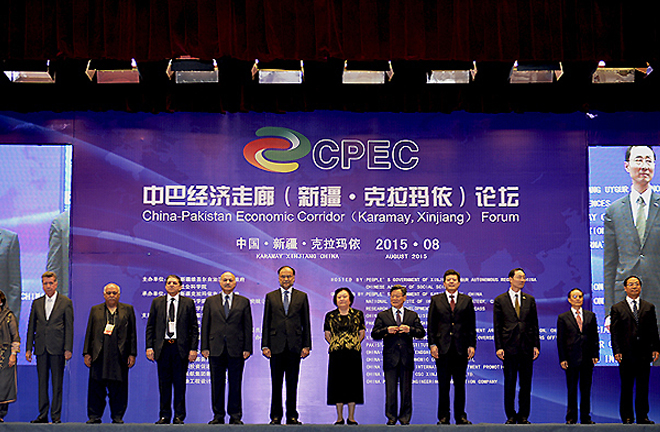Forum: China-Pakistan corridor vital to ‘One Belt, One Road’
 The China-Pakistan Economic Corridor Forum 2015 was held in Karamay, Xinjiang Uygur Autonomous Region, from Aug. 11 to 12.
The China-Pakistan Economic Corridor Forum 2015 was held in Karamay, Xinjiang Uygur Autonomous Region, from Aug. 11 to 12.
The China-Pakistan Economic Corridor, one of six economic corridors specified in the “One Belt, One Road” initiative, is a focus of cooperation between the two countries. Scholars discussed how to realize pragmatic cooperation along the corridor at the China-Pakistan Economic Corridor Forum 2015 in Karamay, Xinjiang Uygur Autonomous Region, from Aug. 11 to 12.
The forum aims to implement a series of goals set during Chinese President Xi Jinping’s Pakistan visit. The role of the forum is to fully coordinate government, industrial, academic and research resources to facilitate the pragmatic construction of the economic corridor and the integration of local institutions, especially enterprises, into “One Belt, One Road.”
The forum was divided into six sub-forums. Approximately 300 delegates from Chinese and Pakistani governments, enterprises, think tanks, social organizations and media outlets were engaged in discussions about such issues as urban cooperation, industrial connection, information corridor, humanities and social sciences, capacity building and the role of youth.
Constructing think tanks and fostering international cooperation along the Silk Road Economic Belt and the 21st Century Maritime Silk Road were the major topics of the forum. Participants suggested that exceptional Chinese and Pakistani think tanks should work together to build a platform for consultation in policymaking and research.
To this end, Wang Weiguang, president of the Chinese Academy of Social Sciences, said that CASS has launched the National Think Tank for Global Strategic Research and participated in the building of the China-Pakistan Economic Corridor through such projects as the Randi International Think Tank.
In the Internet era, the concept of “Internet Plus” should be incorporated into the “One Belt, One Road” initiative to establish a China-Pakistan information corridor that can be virtually operated by technological means, such as cloud computing, big data and information mining to ensure flexible, accurate and authoritative guidance for decision-making, scholars said.
Sound communication between the people of China and Pakistan is the foundation for the joint construction of the Silk Road Economic Belt. Attendees at the forum said people-to-people exchanges are a starting point and suggested that the two sides seize the opportunity of the “2015 Year of China-Pakistan Friendly Exchange” to enhance communication between Chinese think tanks, media, youth and academics and their Pakistani counterparts. Furthermore, efforts should be made to jointly protect historical and cultural heritage along the corridor and strengthen religious and cultural exchanges between the two sides.
At the closing ceremony on Aug. 12, attendees also signed 20 memoranda of cooperation worth approximately 10.35 billion yuan ($1.62 billion) and passed the Karamay Declaration.
The forum was co-sponsored by the Government of Xinjiang Uygur Autonomous Region and CASS.
Deng Zhimei is a reporter at the Chinese Social Sciences Today.
